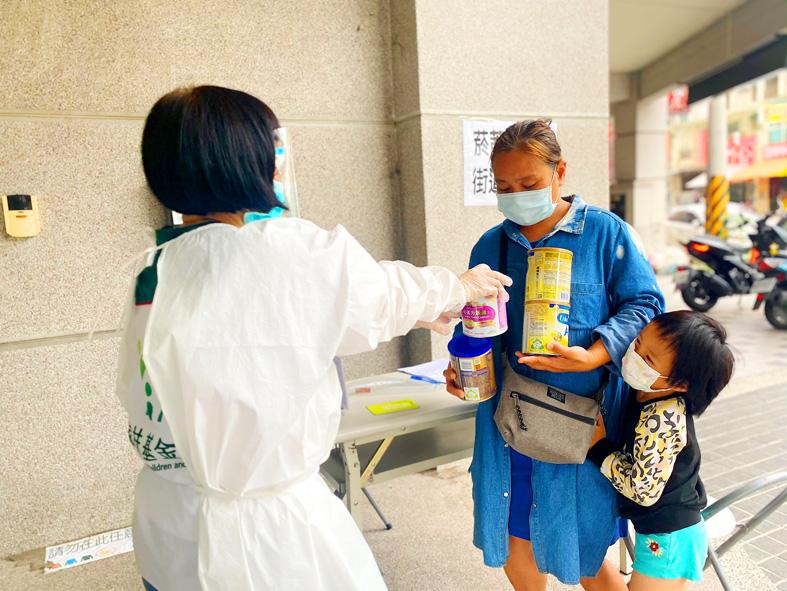Many charity organizations in Taiwan have seen donations fall by half or more since local COVID-19 cases began to spike in May, with some sending urgent calls for renewed support as virus measures ease.
During a nationwide level 3 COVID-19 alert from May 19 to Tuesday last week, in-person donations to the Taiwan Fund for Children and Families (TFCF) dropped 80 percent, TFCF Social Resources Department director Lin Hsiu-feng (林秀鳳) said.
Corporate and private donations also fell sharply, as businesses lost income and individuals suddenly encountered financial hardship, she added.

Photo courtesy of the Taiwan Fund for Children and Families
The disruptions resulted in a 45 percent decline in the fund’s donation income, while donations of supplies have entirely stopped, she said.
“Social welfare groups have all entered a cold spell,” Lin said.
Even the TFCF’s regular operations have been affected, Lin said, giving for example a case in which an aid recipient was reported by a neighbor for gathering illegally after going to the fund to collect a monthly support package.
Many service and gig workers have lost their livelihoods due to the COVID-19 pandemic, making the resources provided by welfare organizations more necessary than ever, she said.
Aside from distributing emergency funding to 2,300 households, TFCF workers call recipients at least twice a week to check on them and deliver supplies in urgent cases — even to remote mountain areas — to ensure that no one goes hungry during the pandemic, she said.
The fund helps nearly 30,000 households, 60 percent of which do not have a computer, Internet access or other equipment needed for remote education, Lin said.
Fearing they would be expected to provide compensation for any damage to borrowed school equipment, many families have pulled their children out of school or have multiple children sharing one cellphone to do schoolwork, she said.
To ensure educational equity in digital learning even after the pandemic, TFCF is calling for donations of tablets, computers and other devices, Lin added.
Meanwhile, Huashan Social Welfare Foundation representative Yang Ya-ling (楊雅苓) said that donations to the organization have halved since the local COVID-19 outbreak was first detected in May.
Receipt donations have also dropped and volunteers have stopped going to the foundation, but the most apparent loss has been donations of goods such as nutritional supplements and nonperishable food items, Yang said.
Directors of local offices have been left to replenish necessary articles and deliver pandemic supplies to elderly recipients themselves, she added.
Community care centers have been closed during the outbreak, depriving elderly people of interpersonal interaction, Yang said, adding that one person even called herself on a public phone out of desperation.
The foundation has maintained its phone conversation service to help older people retain their mental acuity, she said.
The Genesis Social Welfare Foundation said it has also been hit hard by the pandemic.
The foundation cares for more than 800 people in vegetative states by providing around-the-clock nursing care, restorative facilities, adult diapers, nutritional supplements, bill payment sercives and more, costing at least NT$4,000 per person every month, it said.
However, as people have been shopping less since the local outbreak began, receipt donations have been severely affected, resulting in lost income of more than NT$3 million, it added.

Alain Robert, known as the "French Spider-Man," praised Alex Honnold as exceptionally well-prepared after the US climber completed a free solo ascent of Taipei 101 yesterday. Robert said Honnold's ascent of the 508m-tall skyscraper in just more than one-and-a-half hours without using safety ropes or equipment was a remarkable achievement. "This is my life," he said in an interview conducted in French, adding that he liked the feeling of being "on the edge of danger." The 63-year-old Frenchman climbed Taipei 101 using ropes in December 2004, taking about four hours to reach the top. On a one-to-10 scale of difficulty, Robert said Taipei 101

Nipah virus infection is to be officially listed as a category 5 notifiable infectious disease in Taiwan in March, while clinical treatment guidelines are being formulated, the Centers for Disease Control (CDC) said yesterday. With Nipah infections being reported in other countries and considering its relatively high fatality rate, the centers on Jan. 16 announced that it would be listed as a notifiable infectious disease to bolster the nation’s systematic early warning system and increase public awareness, the CDC said. Bangladesh reported four fatal cases last year in separate districts, with three linked to raw date palm sap consumption, CDC Epidemic Intelligence

US climber Alex Honnold left Taiwan this morning a day after completing a free-solo ascent of Taipei 101, a feat that drew cheers from onlookers and gained widespread international attention. Honnold yesterday scaled the 101-story skyscraper without a rope or safety harness. The climb — the highest urban free-solo ascent ever attempted — took just more than 90 minutes and was streamed live on Netflix. It was covered by major international news outlets including CNN, the New York Times, the Guardian and the Wall Street Journal. As Honnold prepared to leave Taiwan today, he attracted a crowd when he and his wife, Sanni,

Taiwanese and US defense groups are collaborating to introduce deployable, semi-autonomous manufacturing systems for drones and components in a boost to the nation’s supply chain resilience. Taiwan’s G-Tech Optroelectronics Corp subsidiary GTOC and the US’ Aerkomm Inc on Friday announced an agreement with fellow US-based Firestorm Lab to adopt the latter’s xCell, a technology featuring 3D printers fitted in 6.1m container units. The systems enable aerial platforms and parts to be produced in high volumes from dispersed nodes capable of rapid redeployment, to minimize the risk of enemy strikes and to meet field requirements, they said. Firestorm chief technology officer Ian Muceus said